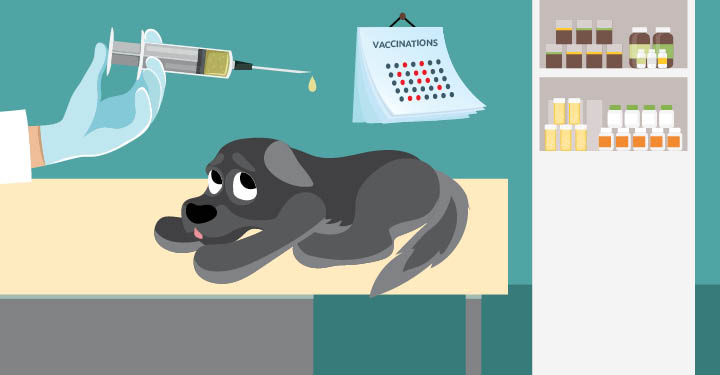Day after day, we hear stories about the dangers of annual dog vaccines and the harm they do to our dogs. Over-vaccination can cause your dog problems ranging from immediate allergic reactions to life-long chronic disease and even death.
Despite the fact that your dog doesn’t need boosters to protect him, far too many vets (as many as 60% of US vets, according to some sources) are still vaccinating their patients annually …
And they’re doing it without bothering to inform dog owners that boosters are usually unnecessary – and they’re also risky. Dog owners trust their vets and often don’t question their recommendations.
But you should question your vet’s recommendations because no vaccine comes without risks. Every time you give a vaccine, there’s a chance your dog can be hurt by it. And doing annual dog vaccines increases those chances.
Sadly many veterinarians aren’t even aware of these risks themselves. It’s not surprising they don’t tell you about them. But it’s still a shameful practice.
RELATED: Are vets getting away with murder?
You Should Be Told About The Risks
So, what happened to informed consent? The American Veterinary Medical Association (AVMA) Principles of Veterinary Medical Ethics doesn’t contain much at all as far as advice for its members on this issue. There’s just one clause stating:

Unfortunately it seems that many vets interpret this as something they should do when they recommend a surgical procedure. This means they don’t include annual dog vaccines as a “treatment regimen” they need to explain to their clients. This usually means that, unless you ask, you’re not being told.
This is especially dangerous if your dog isn’t completely healthy, or has experienced a vaccine reaction in the past. Even the vaccine labels say that vaccines should only be given to healthy dogs. Yet many vets continue to vaccinate dogs who come to the clinic for other issues: “Let’s give Fluffy her shots while she’s here for her urinary tract infection.” This ignores the increased risk to your dog.
And vets who vaccinate annually aren’t even following the overly conservative American Animal Hospital Association (AAHA) Guidelines. For for core vaccines (distemper, parvovirus and adenovirus-2) these suggest a schedule of one year after the initial puppy series of vaccines and then every three years after that.
The World Small Animal Veterinary Association (WSAVA) proposes similar timing but does preface its 2015 Vaccination Guidelines by saying:

No Obligation To Give Annual Dog Vaccines
The AAHA and WSAVA guidelines are just that – guidelines. There’s no law or formal requirement for vets to follow their suggested schedules for annual dog vaccines.
But many dog owners seem to be under the impression that core vaccines are “required” – that they’re a legal obligation. They’re not!
NOTE: The only vaccination required by law is rabies (every three years in most US states and some Canadian provinces), after an initial vaccination and one year booster, so don’t let your vet tell you otherwise.
How Do You Know Your Dog’s Protected?
Most dogs are protected for several years – even for life in many cases – by the core vaccines they got as puppies (or, for adult rescues, shots they got at the shelter). And that’s without any boosters! Decades-old research by veterinary immunologist Ronald D Schultz PhD showed that immunity from most core vaccines can last as long as nine to 15 years, making annual dog vaccines unnecessary.
RELATED: More information about vaccine duration of immunity …
Don’t want to just assume your dog is safe from disease? You can ask your vet for titers. Titers are blood tests that show the level of protection your dog has to a specific disease.
How To Get Titers
Titers used to be more expensive, but now there are two types of economical in-clinic titer tests that may be available at your vet.
- TiterCHEK offers testing for canine distemper and canine parvovirus with results shown as positive or negative.
- VacciCheck offers testing for canine adenovirus, canine distemper, canine parvovirus, with results shown as negative, low positive, significant positive or high positive.
If your clinic doesn’t have these in-house tests, you can still ask your vet for titers from an outside laboratory.
But some vets don’t like offering titers, or will charge a ridiculous amount of money for them (we’ve heard reports of as much as $200 to $300!). This is usually done to tempt dog owners to make the risky decision to save money by just getting the vaccinations instead.
So what can you do then? You can get titers yourself for the most important tests – distemper and parvovirus. Here’s what to do.
- Ask your vet to draw the blood for a titer. That’s a simple procedure that should cost about $15 to $20.
- Go online to Hemopet, check Distemper & Parvo Vaccine Titers on the form, and submit the form along with your payment (currently $52).
- Mail the blood sample (wrap it in some packing paper or bubble wrap and ship it in a US Postal Service Small Flat Rate Box works quite well for about $6) to Hemopet.
- Hemopet will send the results to you and your vet and they’ll advise you whether your dog needs to be revaccinated or not.
RELATED: Titers are an important tool to protect your dog …
So, are annual dog vaccines necessary? When it comes to protecting your dog, don’t just take your vet’s word for what your dog needs. Do your research before you take him to the clinic, and be prepared to stand your ground if your vet recommends giving unnecessary vaccinations. Your dog’s health depends on it.














